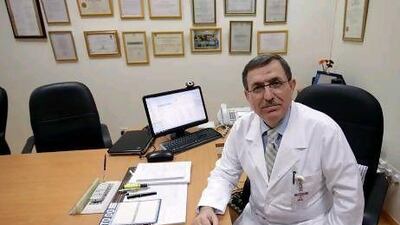Some experts say there is no need for a national screening programme for prostate cancer - although almost half of patients begin treatment at a stage when the chance of survival is slim.
The latest health authority figures showed that in 2010, 41 per cent of patients were either found to have the disease or began treatment at stage four, when the five-year survival rate drops to about 30 per cent.
Yet many doctors believe national screening is not necessary, said Dr Jalaa Taher, section head of cancer control and prevention at the Heath Authority-Abu Dhabi.
"All patients should report any symptoms early," said Dr Taher. "Doctors should also screen people but we still don't recommend a national screening programme."
Some patients in whom the condition is diagnosed at an early stage refuse treatment because of side-effects, which can include impotence and incontinence.
"They only agree to take treatment when the cancer had started to metastasise [spread to other parts of the body]," said Dr Taher.
According to Cancer Research UK, the five-year survival rate for men found to have the disease at stage one or two is almost 100 per cent. This falls to between 70 and 80 per cent at stage three.
Thanks to new technology, which is still under trial in the UK, side-effects may eventually disappear.
According to the most recent Lancet Oncology journal, a 41-patient study found that ultrasound treatment could reduce the risk of impotence and incontinence.
But while more is being done to improve treatment, doctors must still keep a close eye on high-risk patients, said Dr Taher.
Men older than 50 who show symptoms - such as an inability to urinate or an increase in nocturnal urination - should automatically be screened using PSA, the prostate specific antigen blood test.
Screening includes a clinical exam, a rectal sonogram and the PSA test. The last can be done annually.
in 2008 the national health insurance company, Daman, made annual screenings free for men aged 45 and older.
In 2010, 53 men - a third of them Emiratis - were found to have prostate cancer, and there were seven deaths last year. This is the most recent data available.
Despite the lack of a national screening programme, the incidence of prostate cancer in the UAE is low, said Dr Taher.
"All the well-respected health authorities don't recommend conducting screening programmes," he said. "But as it is included in Thiqa [the insurance programme for UAE nationals], if they want to have it, or if there is some history of it in their family, they can get it done.
"We have different kinds of cancer, so why don't we screen for all of them? We screen according to the progression of the disease."
A screening programme would not be cost-effective, said Dr Taha Ibrahim, the hospital director of Al Noor Hospital. "Prostate cancer in this area is not that high. Because of that, there is no stimulus for an active screening programme."
But others disagree, such as Dr Waleed Hassen, the chair of Tawam Hospital's urology department and an assistant professor of urology for Johns Hopkins Medical Institutions.
An unpublished 21-month study from Tawam, which the doctor conducted two years ago, revealed that 41 cases out of 98 tested positive for prostate cancer. "These were cases that were detected by screening and did not include cases that were referred to the hospital," said Dr Hassen. "The [Haad] data is inaccurate … it is a matter of under-reporting."
The Haad data, which came from Tawam, accounted for roughly 80 per cent of cases, said Dr Taher.
When asked about a national screening programme, Dr Hassen believes that "there is no question that more should be done".
His research also showed that the prevalence of the disease was probably comparable to other countries and not as low as some experts think.
"We found a much higher rate of aggressive [forms of the] disease," said Dr Hassen. "We [found] tumours that were potentially lethal."
The Haad data revealed that prostate cancer is the fourth most common form of the disease among men in the UAE. It is the most common form of the disease among men in the UK, US and Australia, and the tenth-leading cause of death among men with cancer.
Most cases worldwide are in men older than 50, although the youngest patient in the UAE, in 2010, was 45.
"This is a young population, like most of the Middle East, so you do not expect a huge amount of numbers," said Dr Hassen. "As the population gets older, we are going to see more cases and the medical establishment needs to be prepared.
‘Being tested saved my life’
Ali, who has lived in the Emirates for 36 years, was alerted to the need to be examined by a conversation about a mutual friend who had been told he had the disease.
“I was speaking to my friend and he said to me, ‘He [the mutual friend] is 60 and he never went, all this time, to get the test.’ He could not believe it.
“I said to him, ‘I’m 62 and I haven’t done the test either.’ He told me to go do it, so I did.”
The visit saved his life. His doctor diagnosed stage-one prostate cancer.
Ali was given the all-clear several years ago but still has check-ups. He said it was the responsibility of doctors to tell men about the importance of screening.
“They say anybody over the age of 40 should start doing the tests,” he said. “When I went to my doctor he said I should have had this test a long time ago.
"It seems that my [previous] doctors were at fault because they should have asked me. Doctors should really advise their patients."
* Zaineb Al Hassani

